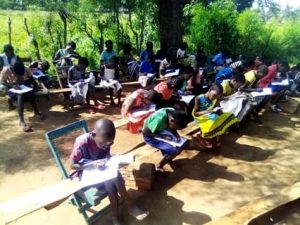What we do
Thematic Area: 1
Early Childhood Development and Education (ECDE)

PDIA works to enhance access to quality Early Childhood Development and Education (ECDE). In Uganda, only a tenth of children between 3 and 5 years are enrolled in formal pre-primary education and yet Early Childhood Development is key to a full and productive life and fundamental to the progress of a nation. PDIA in collaboration with communities establishes community -Based Early Childhood Development Centres for children aged 3 – 8 years.
PDIA focuses on improving literacy and numeracy skills for children of 3-8 years. Many children and young people in Uganda cannot read and write and this constitutes a learning crisis and runs particularly deep in vulnerable communities of Northern and Eastern Uganda and refugee host districts where multi-lingual classroom environments and a high number of out of school and over age learners presents additional obstacles to teaching children to read and providing a positive culture of reading (UWEZO 2018). Learning outcomes generally remain low at primary level and only half of children at P.6 reach the expected levels in literacy and numeracy (UNESCO 2018). PDIA equips children with foundational skills in literacy and numeracy needed for further learning. PDIA also establishes Community-Based libraries to further support development of reading culture among children.
Teacher Training is a key component of PDIA programming. PDIA recognizes that Teacher Capacity development and training is a key factor in achievement of both Education For All (EFA) goals, MDGs and Realization of outstanding learning outcomes. PDIA recognizes the need to continuously improve on teacher quality for achievement of these.
PDIA believes in the power of play to stimulate and enhance learning in the early years of growth and development. PDIA believes that this can be achieved if the various structures within the echo system are empowered and strengthened to understand and support learning through play. PDIA leverages on locally available resources and integrates play into the classroom and home activities making learning fun and enjoyable. PDIA will further integrate gamming technology into learning, using digital approach to learning – using tablet computers to enhance literacy and numeracy skills. In collaboration with communities, PDIA establishes safe play spaces within the community to enhance skills for holistic development.
